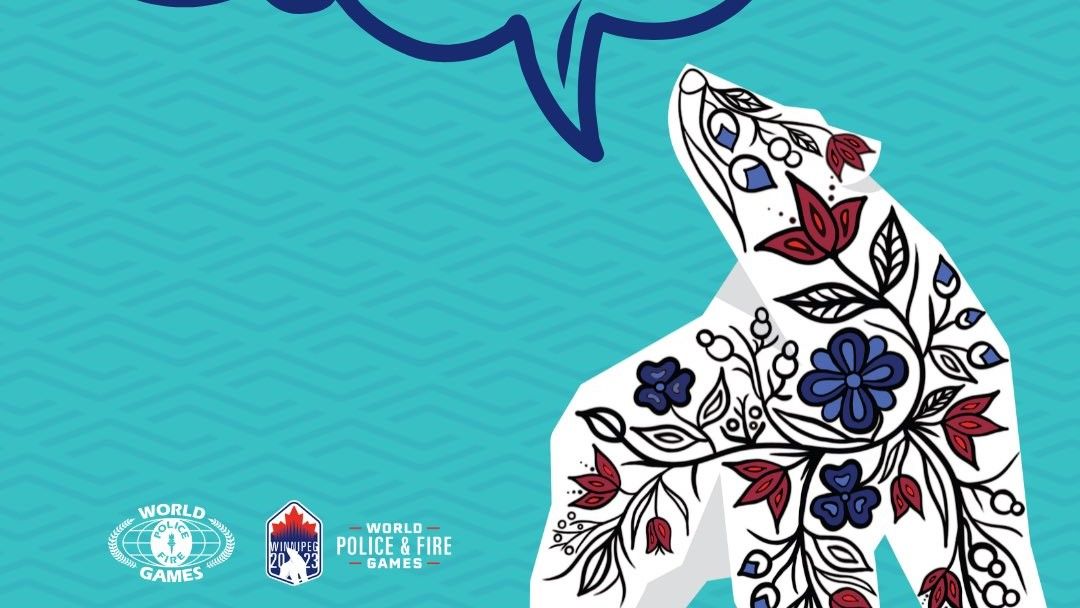On June 21st, Indigenous Peoples’ Day, the World Police and Fire Games (WPFG) published a news release celebrating the game’s Indigenous Advisory Committee, intended to ensure that the game’s “continue to work towards Reconciliation, collaboration and planning respectfully here in Manitoba.”
The WPFG’s organizing committee claims that it is helping advance several calls to action in the Truth and Reconciliation Commission of Canada: “creating sports programs that are inclusive to Indigenous communities, including Indigenous culture and ensuring proper representation and observance of Indigenous protocols at sporting events.” While the “games” may indeed incorporate Indigenous representation, it is abundantly clear that the invitation of up to 8,500 law enforcement officers to Winnipeg — including police, corrections officers, immigration agents, border guards, and other carceral personnel — is a blatant affront to the safety, security, and wellbeing of Indigenous people throughout the city.
The TRC’s Calls to Action featured 17 calls to reform the justice system by all levels of government across Canada. The Winnipeg Police Service (WPS), and police broadly, actively stand in the way of a number of those calls. For instance, Call to Action #30 calls upon federal, provincial, and municipal governments to commit to eliminating the overrepresentation of Aboriginal people in custody over the next decade. Call to Action #38, similarly, calls for all levels of government to commit to eliminating the overrepresentation of Aboriginal youth in custody. The WPS have been completely incapable of demonstrating any strides in answering either of these calls, because it exists to uphold settler-colonial and capitalist rule.
In 2019, three out of four people admitted into federal custody were Indigenous. Overt racial prejudice and systemic racism by the police means Indigenous people are routinely profiled, harassed, and made to feel unsafe in Winnipeg and Manitoba more broadly. A survey of police interactions with Indigenous people by the Southern Chiefs’ Organization demonstrated that 70% of respondents who had interacted with the police had personally experienced racism during those interactions. In a direct conflict with Call to Action #38, police in Winnipeg are incredibly harmful and racist in their interactions with Indigenous Youth. In 2020 a Winnipeg police officer murdered Eishia Hudson, a 16 year-old Indigenous girl, and was cleared of wrongdoing. A recent study by Fadi Ennab in Winnipeg school’s demonstrates the ways in which WPS’ presence in school actively harms racialized students. Youth interviewed shared specific stories of racial targeting by police as well as examples of the ways in which racial targeting harmed student’s self esteem, made them more likely to miss school, and drastically reduced a student’s sense of safety in the classroom. Rather than learning from the report and supporting the recommendation to remove police from schools (which would be an obvious step towards Call to Action #38) Police Chief Danny Smyth decided to baselessly attack the credibility of Ennab’s research instead.
The WPS has been oppressing Indigenous people for a long time. After the WPS killing of John Joseph Harper in 1988, the Aboriginal Injustice Inquiry was launched, which intended to examine the role of systemic racism in police violence against Indigenous people. Following the inquiry the police were provided with 50 recommendations specific to policing to reduce systemic racism. To this day, the WPS has not indicated that they track progress on any of those recommendations, but research suggests the WPS has partially or fully implemented only 12 of the 50 recommendations.
Another of the TRC Calls to Action is #31, which calls upon federal, provincial, and territorial governments to provide funding to enact community sanctions that provide alternatives to imprisonment for Aboriginal offenders and respond to the underlying causes of offending. Alternatives to imprisonment, to policing, and to the carceral system require funding; funding which is hard to come by in Winnipeg and elsewhere, yet all three levels of government have come together to put millions towards the WPFG. Additionally, the WPS accounts for over a quarter of the city's yearly budget. Monopolizing incredibly important government funds, thereby funneling them away from life-saving solutions to “respond to the underlying causes of offending” such as homelessness, mental health struggles, and poor housing conditions, is demonstrative action against reconciliation.
Of course, the WPFG are not only about the Winnipeg Police Service: they are about police and carceral agents more generally. Policing in Canada was originally founded on colonial models of policing in England and France. Canada’s introduction of police in the form of the North-West Mounted Police, which would eventually become the RCMP, was in 1873 and was created with the specific colonial purpose of securing dominion over ‘Canada’s territory.’ In fact, the RCMP’s origins were rooted in a need to quash dissent in the North West from Louis Riel, meaning policing’s origin in Canada and in the province is quite literally founded in the hanging of Riel. Their origin is in the killing of Inuit sled dogs for the express purpose of erasing Inuit sovereignty. Their origin is in the displacement of Indigenous people.
WPFG’s invitation of thousands of carceral agents to Winnipeg is in direct conflict with reconciliation. Their monopolization of government funds actively obstructs reconciliation. The police’s very founding and continued operation is irreconcilable with reconciliation.
A genuine attempt at working towards reconciliation could only look like the cancellation of the World Police and Fire Games and the use of public funds for reconciliation, by way of housing, food security, harm reduction, and reparations — rather than carceral spectacle.
